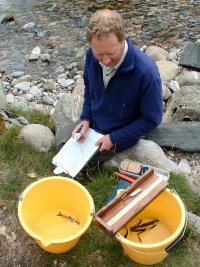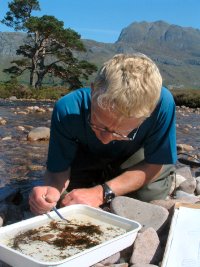Juvenile fish surveys

Recording details of anaesthetised juvenile salmon and trout

Sorting a kick sample of invertebrate larvae by the Grudie River near Loch Maree
During the period July to October, WRFT field teams make the most of every opportunity to survey the rivers and streams of the area for juvenile fish. Up to 16 river systems are surveyed each year. A primary objective is to assess the distribution of juvenile salmon, and thereafter to find out about fish abundance. If healthy populations of juvenile salmon are not found where expected, further investigations may be required to investigate problems. Trout, eels, minnows, sticklebacks, lampreys, and sometimes even small flounders, are also recorded where present during electro-fishing surveys.
Surveys are carried out using trained staff using specially designed electro-fishing equipment. Electro-fishing is a standard survey method that has been developed over many years across Europe and America for investigating fish populations. Fish are temporarily immobilized to enable capture. Following measurement and examination, all fish are returned to the water after a period of recovery. Occasionally a small sample of fish is retained for disease testing. Through marking studies at Tournaig and elsewhere, we, and other fishery scientists, have been able to demonstrate that juvenile salmon caught by electro-fishing survive, grow, and migrate to sea in much the same way as other fish.
Field teams often work alongside fishery proprietors or estate staff. Sometimes there are opportunities for volunteers to help carry equipment. Where possible, problems and possible solutions are discussed on site. Results are presented in river reports along with suggestions or recommendations for actions to address issues of concern to fisheries.
Field workers are trained to follow SFCC (Scottish Fisheries Co-ordination Centre) electro-fishing protocol. This is to ensure safety and consistency of data with that collected by electro-fishing teams working in other parts of Scotland. Data is collected primarily for local fisheries management purposes. Our juvenile fish data has also been used by SEPA, SNH and other government agencies for assessing fish populations on a larger scale. Private companies (including hydro-power developers) sometimes approach the Trust for fisheries information relating to the potential impacts of proposed developments.
Please contact the WRFT biologist if you would like to join a field team for a day. All surveys are weather and river-conditions dependent. A good level of fitness is required and protection from ticks, clegs and midges. Other wildlife is usually encountered, from invertebrate larvae in the stream bed to eagles overhead.
Related Downloads
To download a file, right-click over it's name and choose Save Link/Target As...
-
Malnourished salmon rivers? How important were salmon eggs as food for parr?
Presentation which considers the importance of salmon eggs as a food for pre-smolt salmon parr during the early winter. Is there a need to focus on ways of replacing this direct source of marine derived nutrition from adult salmon to juvenile salmon to help to mitigate for downward spiral of decline in numbers of adult salmon returning to oligotrophic rivers?. Posted: 01/05/2024 (7.42MB) -
Juvenile salmon production and nutrition in Wester Ross 2023
This report summarises the results of the juvenile salmon survey in Wester Ross in summer and early autumn, 2023. The report focusses on contrasting the size and biomass of juvenile salmon at different sites. There was much variation in growth; some sites had high densities of larger parr; at other sites parr were small and thin. Important missing food items for parr at some sites may include caddis fly larvae, terrestrial insects, and surplus washed-out salmon eggs which in some rivers may have been of crucial importance for pre-smolt salmon parr. Is it time to provide supplementary food for juvenile salmon in some rivers? . Posted: 05/02/2024 (1.65MB) -
WRFT Newsletter March 2022
This newsletter provides a summary of some of the work of WRFT over 2021, including some plans for 2022. Posted: 11/03/2022 (2.95MB) -
Status of Juvenile Wild Salmon in Wester Ross Northwest Scotland 2022
This report provides a summary of the results of the 2021 juvenile fish survey in the Wester Ross area, and discusses findings and associated issues relating to the conservation and management of important wild salmon populations in the northwest of Scotland . Posted: 01/02/2022 (5.70MB) -
Badachro smolt trap 2021 article
Article about the River Badachro salmon smolts from trapping study in April - May 2021. The study was supported by the Atlantic Salmon Trust in partnership with Fisheries Management Scotland and Marine Scotland Science. . Posted: 27/06/2021 (1.38MB) -
Loch Maree Wild Trout population structure: first look by Vu Dang
Summary of the main findings of a genetic study of wild trout diversity in and around the Loch Maree catchment area with suggestions for conservation management by V Dang (MScRes. student) of Middlesex University. Posted: 28/05/2019 (3.61MB) -
Skye and Wester Ross Fisheries Trust Review February 2018
This review summarises the work of the Skye and Wester Ross Fisheries Trust during the period June 2016 to December 2018. Posted: 06/02/2018 (7.46MB) -
Response to Scottish Government MPA Management consultation
Here is our response to the Scottish Government's 2014 Consultation on fisheries management measures for new MPAs in Scotland. The response provides answers to questions in the2014 Consultation Response document relating to the Wester Ross Marine Protected Area. It also includes proposals for a permit system for fisheries within the MPA and for stepwise progression towards a system of management of inshore waters that will achieve nature conservation objectives and fisheries which are more productive and valuable than those of the past 20+ years. Posted: 28/01/2015 (1.07MB) -
Of small fry and big fry
This short report illustrates how the growth of wild salmon fry can vary in Wester Ross even within a small river system. Posted: 03/09/2013 (607KB) -
WRFT Review of Activities 2009 to 2012
This review summaries the work of Wester Ross Fisheries Trust during the period 2009 to 2012 in support of the WRFT Fisheries Management Plan 2009+, and sets priorites for future activities. Posted: 11/12/2012 (2.62MB) -
Wester Ross Sea Trout Scale Catalogue April 2011
The document provides links to photographs of sea trout and their scales from the sea and river estuaries of Wester Ross. The catalogue will be updated in response to comments received. Posted: 05/04/2011 (989KB) -
Little Gruinard FMP April 2011 Part 6
Little Gruinard River FMP April 2011 Part 6. Posted: 03/02/2011 (5.04MB) -
Salmon fry (top) and charr fry (below) from Little Gruinard River system, August 2009
This is the first charr fry recorded by the WRFT electro-fishing team. Please contact the WRFT biologist for mmore information. Posted: 28/08/2009 (220KB) -
Arctic charr discovery week 2008 1st notice
Please download this document for details of the WRFT Arctic charr discovery week. Posted: 09/09/2008 (162KB)